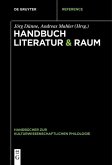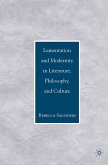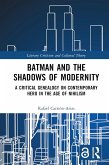In The Topography of Modernity, Elliott Schreiber gives Moritz the credit he deserves as an important thinker beyond his contributions to aesthetic theory. Indeed, he sees Moritz as an incisive early observer and theorist of modernity. Considering a wide range of Moritz's work including his novels, his writings on mythology, prosody, and pedagogy, and his political philosophy and psychology, Schreiber shows how Moritz's thinking developed in response to the intellectual climate of the Enlightenment and paved the way for later social theorists to conceive of modern society as differentiated into multiple, competing value spheres.
Dieser Download kann aus rechtlichen Gründen nur mit Rechnungsadresse in A, B, BG, CY, CZ, D, DK, EW, E, FIN, F, GR, HR, H, IRL, I, LT, L, LR, M, NL, PL, P, R, S, SLO, SK ausgeliefert werden.









